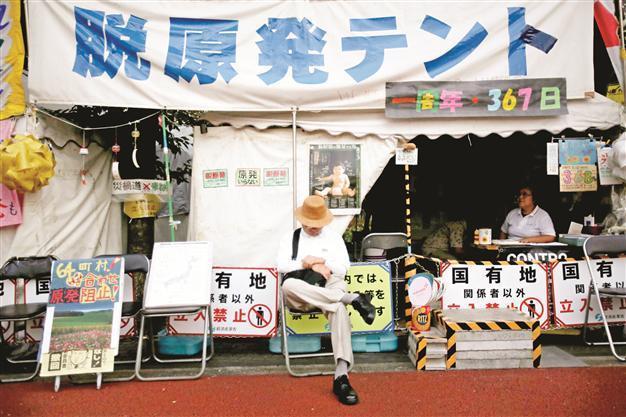Bank of Japan holds steady policy, warns over economy
TOKYO - Agence France-Presse

A anti-nuclear activist takes a nap at a tent in front of Japan’s Economy, Trade and Industry Ministry in Tokyo. The power shortage after the closure of nuclear plants is also hurting Asia’s number two economy. AP photo
The Bank of Japan (BoJ) on Oct. 5 held off fresh easing measures, opting not to build on last month’s boost to its asset-purchase scheme but warned the economy faced risks from a deeper global slowdown.
The BoJ said in a statement its policy board had voted unanimously to keep rates at between zero and 0.1 percent and left an 80 trillion yen ($1.02 trillion) asset purchase program in place.
Last month, the BoJ unveiled plans to boost the fund by 10 trillion yen as pressure increased on the central bank to follow similar moves by its European and US counterparts.
Leaves door open
However, it left the door open to further measures further down the line as it assesses the impact of its latest move on the stuttering economy.
“Regarding risks, there remains a high degree of uncertainty about the global economy, including the prospects for the European debt problem,” the BoJ said.
It was also concerned about, “the momentum toward recovery for the U.S. economy, and the likelihood of emerging and commodity-exporting economies simultaneously achieving price stability and economic growth.” Reiterating concerns over a slowdown at home, the BoJ said: “Exports and industrial production have been relatively weak as overseas economies have moved somewhat deeper into the deceleration phase.” The statement said the bank “recognizes that Japan’s economy faces the critical challenge of overcoming deflation,” adding that it “will proceed with monetary easing in a continuous manner”.
Japan’s new economy and fiscal policy minister Seiji Maehara, an advocate of more stimulus measures, attended the Oct. 5 policy meeting, a move to seen as part of a government move to pressure the bank to take more action.
Maehara, who also serves as a national strategy minister, was the first economy and fiscal policy minister to attend the meeting since Heizo Takenaka in 2003.
Ahead of the meeting, Maehara, who took office at the start of
this week, said he wanted to attend
the meeting “based on the government stance of calling for strong easing financial measures to end deflation.”
Maehara is eligible to attend BoJ meetings and express his opinions, but has no right to vote on monetary decisions by the independent central bank.
